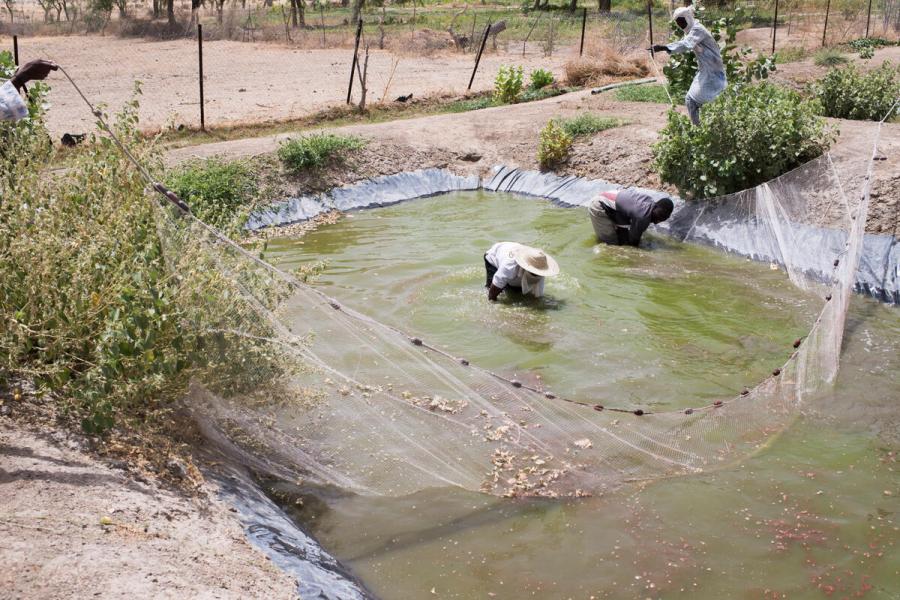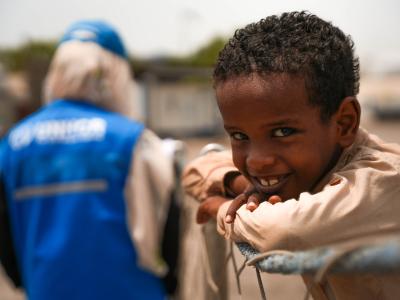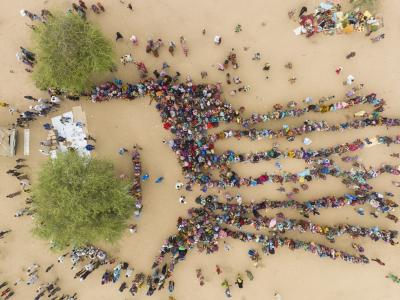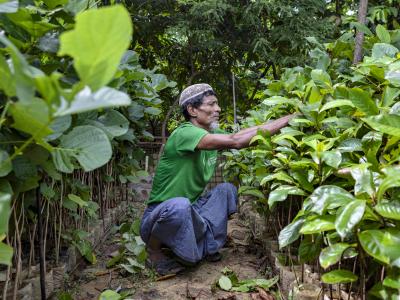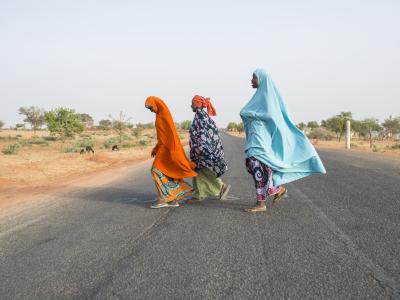Recent decades have seen an overall reduction in the number of UNHCR-facilitated refugee returns, chiefly linked to the protracted nature of the conflicts.
Most forcibly displaced and stateless people remain, awaiting a solution, in low and lower-middle-income countries that have fragile economies and weak national services and are reliant on international assistance. The majority of those who decide to return do so in a self-organized manner, and eliciting relatively little or limited support.
In 2023, 1.052 million refugees returned to their country of origin, compared to 1.356 million who returned in the previous year. (The total number of refugee returnees for 2022 includes 1 million Ukrainian refugees who returned in the calendar year. At the time of writing the Mid-Year Trends 2023, data on returns to Ukraine was just becoming available and it was not possible to distinguish pendular movements from movements made with the intention to stay.)
In Ukraine, UNHCR piloted an area-based approach, aiming to support local authorities and communities in achieving durable solutions for war-affected and displaced people. UNHCR targeted 495 local government entities with material and technical support, repairing and rehabilitating infrastructure and public services premises in key areas, such as health, education and energy, as well as community spaces and (re)integration hubs. These interventions followed consultation and coordination with authorities, communities, and other local stakeholders. UNHCR, IOM and UNDP jointly piloted projects aiming at durable solutions and early recovery in two locations, with plans for 12 more locations in 2024.
South Sudanese refugees returned in greatest numbers in 2023. 527,200 returned overall, including 386,800 from Sudan and 111,100 from Ethiopia. UNHCR continues to support the Government of South Sudan to find immediate solutions for those who opted to return.
The violence in Sudan also prompted almost 5,600 Ethiopian refugees to flee Sudan. However, upon their return to Ethiopia, most of the returnees found their intended destination was inaccessible and they settled in internal displacement camps in the Tigray region. UNHCR provided cash and in-kind support to address their immediate needs.
Over 26,600 Burundian refugees were assisted to return in 2023. The relatively stable political and security situation prompted UNHCR, in discussion with the Governments of Burundi and Tanzania, to transition from facilitating to promoting voluntary repatriation in 2024. The Government of Burundi and UNHCR will continue to mobilize development actors to support the sustainable reintegration of Burundian returnees. Burundian authorities issue all returnees an attestation de reconnaissance. This document grants every returnee access to civil status, national identification documents, and facilitates access to education in areas of return.
In West and Central Africa, UNHCR supported the voluntary repatriation of over 4,000 refugees to the Central African Republic (CAR), mainly from Cameroon and the Democratic Republic of the Congo through its voluntary repatriation programme. It continues to monitor and support an additional 6,000 refugees who returned to CAR independently, without seeking UNHCR support, from Sudan. Additionally, 2,000 Cameroonians voluntarily repatriated from Chad with UNHCR’s assistance, alongside refugees who returned independently. UNHCR and its partners facilitated the issue of legally recognized identity documents to returnees which enabled them to enjoy their basic human rights.
The CAR Solutions Support Platform, launched in November 2023, is foreseen to support the creation of an enabling environment for the sustainable return and reintegration of nearly 300,000 refugees who are expected to voluntarily repatriate between 2024 and 2027. In addition, with the support of UNHCR, a poverty assessment, which included internally displaced persons, was carried out in the CAR by the World Bank. The data generated will support the national authorities and development actors in designing programmes that foster solutions for IDPs and returnees.
Citing concerns around the cost of living and lack of employment opportunities in host countries, the improved security situation in Afghanistan, and family reunification, over 56,800 Afghan refugees returned to Afghanistan under the UNHCR assisted voluntary repatriation programme. The Government of Pakistan’s announcement in October 2023 for undocumented foreigners to leave, which impacted registered refugees and others with valid documents, may have promoted an increasing number of Afghans to seek UNHCR’s support for repatriation. Following the announcement, over 500,000 Afghans returned to Afghanistan from Pakistan. Interviews conducted at several crossing points with Afghans indicated that on average, 35% of returnees interviewed upon arrival stated they had a tazkira, a national identity card, and 59% of households confirmed having one. Tazkira ownership among their spouses and children was 30% and 16% respectively. Together with partners, UNHCR continued efforts to improve conditions for sustainable return through an area-based approach in priority areas of return and reintegration, while providing individual assistance to returnees. To support this, UNHCR and the World Bank established the Strategic Analysis Hub for the Afghanistan situation, launched in late 2022, analysing displacement and return trends as well as challenges and opportunities presented by forced displacement.
12 UNHCR operations collected data on the proportion of returnees with legally recognized identity documents or credentials in 2023, and eight reported that more than 75% of returnees had such documents, suggesting a slight improvement from 2022.
The 2023 Global Refugee Forum generated a dedicated multi-stakeholder pledge on the Afghanistan situation, drawing nearly $500 million in commitments. Dubbed “ReSolve”, this pledge saw commitments, within the framework of the Solutions Strategy for Afghan Refugees, that were specific to safe and dignified voluntary returns in priority areas of return and reintegration. There were also pledges geared towards easing pressures on neighbouring countries hosting Afghan refugees.
The Forum also saw the convening of two multi-stakeholder pledges that sought to build upon promising practices and emerging opportunities for safe and dignified voluntary returns. These pledges on “Peacebuilding and conflict prevention” and “Secure housing, land and property rights” yielded a total of 83 commitments.
Core indicator

14.1 Proportion of returnees with legally recognized identity documents or credentials
Challenges to achieving outcomes
Voluntary repatriation and the sustainability of returns were undermined by fragile or faltering peace processes; continuing insecurity; limited inclusion and participation of refugees in peace processes and repatriation plans; failure to address root causes; destruction or confiscation of housing, land and property; severely overstretched services; and the absence of viable livelihoods.
UNHCR's return package and reintegration support remained underfunded. Increased support from development and peace actors was the pivotal factor in governments’ inclusion of refugees in development plans in areas of return and in national social protection systems. Underfunding of UNHCR also delayed or limited convoys, prompting some refugees to return in a self-organized manner. It also limited UNHCR’s capacity to provide localized and tailored information to forcibly displaced people on conditions in their country of origin.
Financial overview
Global expenditure and budget for Voluntary repatriation and sustainable reintegration
$91 million spent against a budget of $257 million
$166 million of unmet needs or 65% of the budget
